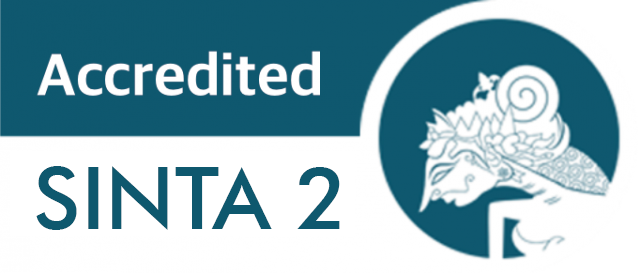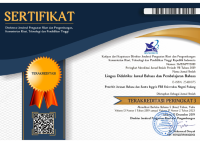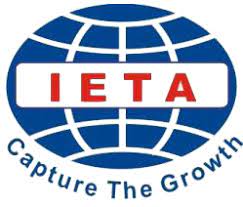Online Learning amid COVID-19 Pandemic: Providing Assessment that Ensures Meaningful Learning Experience
 ), Yih-Sheue Lin(5),
), Yih-Sheue Lin(5), (1) English Language Education, Universitas Muhammadiyah Kalimantan Timur, Indonesia Department of Education and Human Potential Development, National Dong Hwa University, Taiwan
(2) Universitas Lambung Mangkurat
(3) Universitas Lambung Mangkurat
(4) Politeknik Negeri Banjarmasin
(5) Department of Education and Human Potentials Development, National Dong Hwa University
 Corresponding Author
Corresponding Author
Copyright (c) 2022 Lingua Didaktika: Jurnal Bahasa dan Pembelajaran Bahasa
DOI : https://doi.org/10.24036/ld.v16i1.116146
Full Text:
 Language : en
Language : en
Abstract
The paper aims to explore how assessment with principles can be utilized by a teacher during online learning in pandemic situation. Since at the end of year 2019, SARS-CoV-2 virus, also well-known as COVID-19, has affected the global activities including education. Many governments decided to shift the education process from traditional face-to-face classroom to online learning either in synchronous or asynchronous modes. By utilizing systematic review as a method of study, the databases from ERIC, Google Scholar, and DOAJ were used to collect some articles that were related to the studies. These articles were selected through the process of identifying, screening, checking for eligibility, and deciding for inclusion. The findings indicated there are some modes of assessment that not only is it plausible, the varied kinds of assessment would also be a solution for the current real-life educational problems faced by the teachers.
Keywords
References
Adnan, M., & Anwar, K. (2020). How Students’ Perspectives about Online Learning Amid the COVID-19 Pandemic? Studies in Learning and Teaching, 1(3), 133–139. https://doi.org/10.46627/silet.v1i3.46
Allo, M. D. G. (2020). Is the online learning good in the midst of Covid-19 Pandemic ? The case of EFL learners. Jurnal Sinestesia, 10(1), 1–10.
Bradley, B. (2021). Using alternative assessments. Center for Teaching and Learning.
Brown, H. D. (2003). Language Assessment: Principles and Classroom Practices. Pearson ESL.
Dhawan, S. (2020). Online Learning: A Panacea in the Time of COVID-19 Crisis. Journal of Educational Technology Systems, 49(1), 5–22. https://doi.org/10.1177/0047239520934018
Fauzi, I., & Khusuma, I. H. S. (2020). Teachers’ Elementary School in Online Learning of COVID-19 Pandemic Conditions. Jurnal Iqra’ : Kajian Ilmu Pendidikan, 5(1), 58–70. https://doi.org/10.25217/ji.v5i1.914
Gibson, P. A., & Dunning, P. T. (2012). Creating Quality Online Course Design Through a Peer-Reviewed Assessment. Journal of Public Affairs Education, 18(1), 209–228. https://doi.org/10.1080/17432979.2012.717817
Kearns, L. (2012). Student Assessment in Online Learning: Challenges and Effective Practices. MERLOT Journal of Online Learning and Teaching, 8(3), 198–208. http://jolt.merlot.org/vol8no3/kearns_0912.htm
McNally, K. (2016). Literature Review: Systematic literature review. Library Resource Guides. https://libguides.csu.edu.au/review/Systematic
Monib, W. K., Karimi, A. Q., & Nijat, N. (2020). Effects of Alternative Assessment in EFL Classroom: A Systematic Review. American International Journal of Education and Linguistics Research, 3(2), 7–18. https://doi.org/10.46545/aijelr.v3i2.152
Mukhtar, K., Javed, K., Arooj, M., & Sethi, A. (2020). Advantages, limitations and recommendations for online learning during covid-19 pandemic era. Pakistan Journal of Medical Sciences, 36(COVID19-S4), S27–S31. https://doi.org/10.12669/pjms.36.COVID19-S4.2785
Rayens, W., & Ellis, A. (2018). Creating a Student-Centered Learning Environment Online. Journal of Statistics Education, 26(2), 92–102. https://doi.org/10.1080/10691898.2018.1475205
Swan, K., Shen, J., & Hiltz, S. R. (2006). Assessment and Collaborative Learning. Journal of Asynchronous Learning, 10(1), 45–62. http://www.kent.edu/ehhs/dl/upload/assessment-and-collaborati...%0Ahttp://74.125.155.132/scholar?q=cache:UNSM4SAsCTcJ:scholar.google.com/+swan,+shen+hiltz+(2006)&hl=en&as_sdt=80000000
William-White, L. (2016). Striving Toward Authentic Teaching for Social Justice. In De-Testing and De-Grading Schools (pp. 262–287).
 Article Metrics
Article Metrics
 Abstract Views : 404 times
Abstract Views : 404 times
 PDF Downloaded : 115 times
PDF Downloaded : 115 times
Refbacks
- There are currently no refbacks.
Copyright (c) 2022 Lingua Didaktika: Jurnal Bahasa dan Pembelajaran Bahasa

This work is licensed under a Creative Commons Attribution-NonCommercial 4.0 International License.









